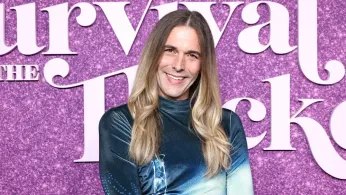
4 hours ago
Family Research Council Condemns Ulta Beauty for Featuring Nonbinary Star Jonathan Van Ness in New Campaign
READ TIME: 3 MIN.
Ulta Beauty, one of the largest beauty retailers in the United States, is under public scrutiny after the Family Research Council (FRC)—a group widely recognized for its anti-LGBTQ+ positions—condemned the company’s decision to feature nonbinary celebrity hairstylist Jonathan Van Ness in its latest nationwide campaign. The controversy erupted following the release of a promotional video on Instagram, where Van Ness is seen entering an Ulta store wearing a multi-colored dress and white heels, visibly excited as employees unveil a display featuring a large poster of him and his haircare brand, JVN Hair. The video quickly went viral, drawing both praise and criticism from viewers.
The Family Research Council claims that Van Ness’s exuberant behavior in the video—characterized as “jumping and shrieking”—amounts to mocking women and “what he perceives to be female behavior.” The group further alleges that Ulta Beauty is promoting a caricatured and stereotypical representation of femininity by platforming transgender and nonbinary influencers. FRC also cited Ulta’s past collaborations, including a now-deleted podcast episode with transgender influencer Dylan Mulvaney, as evidence of a broader corporate trend they view as objectionable.
These criticisms echo previous controversies in the beauty and beverage industries. In 2023, Mulvaney faced backlash after a Bud Light promotional campaign led to widespread boycotts and significant financial losses for Anheuser-Busch, Bud Light’s parent company. Ulta itself previously faced backlash over partnerships with LGBTQ+ influencers, most notably in 2022, when it featured Mulvaney in brand content.
The Ulta Beauty campaign has ignited passionate debate on social media platforms, with the hashtag #BoycottUltaBeauty trending on X (formerly Twitter). Critics have accused the company of being “out of touch” with its customer base and compared the backlash to the Bud Light episode, warning that Ulta might face similar repercussions.
Some internet users have specifically targeted Van Ness’s nonbinary identity and gender expression, claiming the promotional video “mocks women” and fails to represent “real women’s needs.” Others have called for the company to reverse its inclusive marketing strategy and have publicly pledged to stop shopping at Ulta stores.
As of publication, Ulta Beauty has not issued a public statement addressing the recent criticism or boycott calls. The brand’s choice to work with Van Ness, however, aligns with its ongoing commitment to diversity and inclusion. Van Ness, who uses they/them, he/him, and she/her pronouns, has been outspoken about the importance of self-expression, authenticity, and inclusive representation in the beauty industry. Their haircare brand, JVN Hair, is marketed as gender-inclusive and designed for people of all identities.
LGBTQ+ advocates and allies have responded by emphasizing the need for greater visibility and acceptance of nonbinary and transgender people in mainstream spaces. Many have pointed out that such campaigns help challenge outdated norms and foster an environment where everyone can feel seen and celebrated. “Beauty is for everyone, and representation matters. When brands like Ulta choose to feature LGBTQ+ talent, it sends a powerful message that all identities are valid,” said a spokesperson for GLAAD in a public statement.
The debate over Ulta’s campaign with Jonathan Van Ness highlights broader tensions around representation, marketing, and cultural change in the beauty industry. While some consumers and advocacy groups push for traditional definitions of gender and femininity, others view inclusive advertising as a critical step forward in breaking down barriers and stereotypes.
As the campaign continues to spark discussion, Ulta Beauty’s response—or lack thereof—may set a precedent for how major brands navigate the evolving landscape of identity, inclusion, and consumer activism. For now, the company’s collaboration with Van Ness stands as a focal point in an ongoing conversation about who gets to be seen and celebrated in beauty, media, and beyond.






